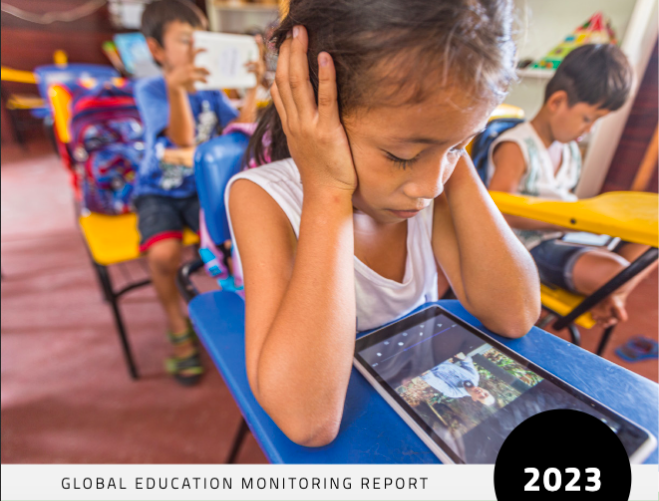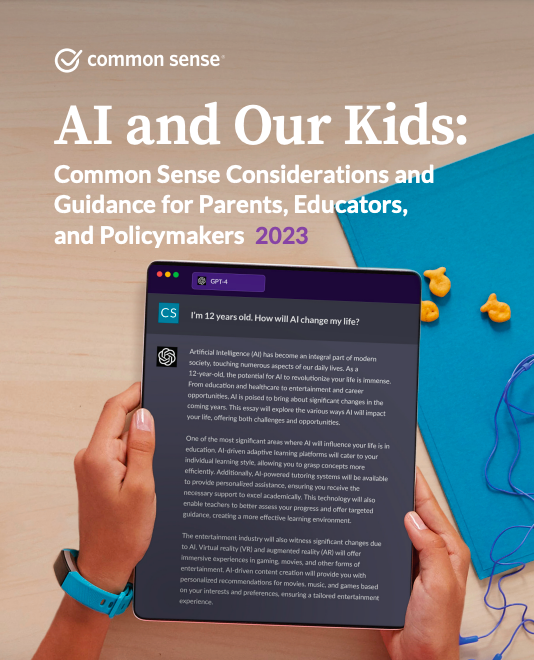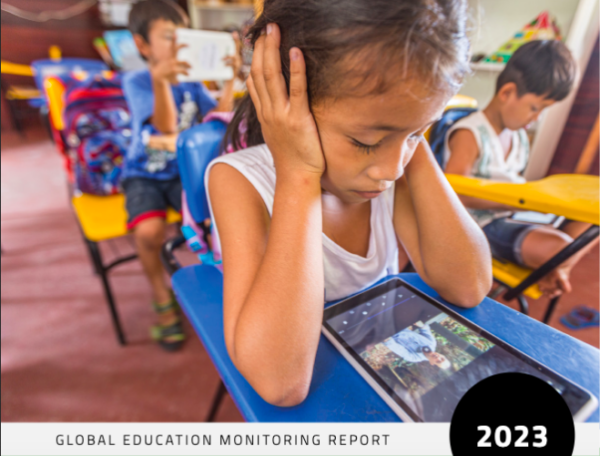The 2023 Global Education Monitoring Report launched last week at an event in Montevideo, Uruguay, hosted by UNESCO, the Ministry of Education and Culture of Uruguay and Ceibal Foundation with 18 ministers of education from around the world. It proposes four questions that policymakers and educational stakeholders should reflect upon as technology is being deployed in education:

Is it appropriate?
Using technology can improve some types of learning in some contexts. The report cites evidence showing that learning benefits disappear if technology is used in excess or in the absence of a qualified teacher. For example, distributing computers to students does not improve learning if teachers are not involved in the pedagogical experience. Smartphones in schools have also proven to be a distraction to learning, yet fewer than a quarter of countries ban their use in schools.
“We need to learn about our past mistakes when using technology in education so that we do not repeat them in the future,” said Manos Antoninis, Director of the Report. “We need to teach children to live both with and without technology; to take what they need from the abundance of information, but to ignore what is not necessary; to let technology support, but never supplant human interactions in teaching and learning.”
Learning inequities between students widen when instruction is exclusively remote and online content is not always context appropriate. A study of open educational resource collections found that nearly 90% of higher education online repositories were created either in Europe or in North America; 92% of the material in the Open Educational Resources Commons global library is in English.
Is it equitable?
During the COVID-19 pandemic, the rapid shift to online learning left out at least half a billion students worldwide, mostly affecting the poorest and those in rural areas. The report underlines that the right to education is increasingly synonymous with the right to meaningful connectivity, yet one in four primary schools do not have electricity. It calls for all countries to set benchmarks for connecting schools to the internet between now and 2030 and for the focus to remain on the most marginalized.
Is it scalable?
Sound, rigorous and impartial evidence of technology’s added value in learning is needed more than ever, but is lacking. Most evidence comes from the United States, where the What Works Clearinghouse pointed out that less than 2% of education interventions assessed had ‘strong or moderate evidence of effectiveness’. When the evidence only comes from the technology companies themselves, there is a risk it may be biased.
Many countries ignore the long-term costs of technology purchases and the EdTech market is expanding while basic education needs remain unmet. The cost of moving to basic digital learning in low-income countries and connecting all schools to the internet in lower-middle-income countries would add 50% to their current financing gap for achieving national SDG 4 targets. A full digital transformation of education with internet connectivity in schools and homes would cost over a billion dollars per day just to operate.
Is it sustainable?
The fast pace of change in technology is putting strain on education systems to adapt. Digital literacy and critical thinking are increasingly important, particularly with the growth of generative AI. Additional data attached to the report show that this adaptation movement has begun: 54% of surveyed countries have defined the skills they want to develop for the future. But only 11 out of 51 governments surveyed have curricula for AI.
In addition to these skills, basic literacy should not be overlooked, as it is critical for digital application too: students with better reading skills are far less likely to be duped by phishing emails.
Moreover, teachers also need appropriate training yet only half of countries currently have standards for developing their ICT skills. Few teacher training programmes cover cybersecurity even though 5% of ransomware attacks target education.
Sustainability also requires better guaranteeing the rights of technology users. Today, only 16% of countries guarantee data privacy in education by law. One analysis found that 89% of 163 education technology products could survey children. Further, 39 of 42 governments providing online education during the pandemic fostered uses that ‘risked or infringed’ on children’s rights.
Common Sense Media, the nation’s leading kids and technology nonprofit, announced plans to develop an in-depth AI ratings and reviews system that will assess AI products on a number of dimensions including responsible AI practices and suitability for children, with a special focus on products that are used by kids and educators.

According to a recent poll from Common Sense Media and Impact Research, there is an overwhelming desire among parents (82%) for a rating system that will help them evaluate the quality of AI programs like ChatGPT. Over three-quarters of parents surveyed say they are interested in AI-powered education tools that help their children learn (77%), but only 40% say they know of a reliable source of information that they can use to learn about AI’s appropriateness for kids.
“We must act now to ensure that parents, educators, and young people are informed about the perils and possibilities of AI and products like ChatGPT,” said James P. Steyer, founder and CEO of Common Sense Media. “It is critical that there be a trusted, independent third-party rating system to inform the public and policymakers about the incredible impact of AI. In recent years, a number of tech companies have put profits before the well-being of kids and families. We have seen this movie before, with the emergence of social media and the subsequent failure to regulate these platforms, and, unfortunately, we know how that version ends. Quite simply, we must not make the same mistakes with AI, which will have even greater consequences for kids and society.”
Common Sense Media’s AI ratings and reviews system is being developed with input from leading experts in the field of artificial intelligence. The ratings and reviews will also inform new legislative and regulatory efforts to keep kids safe online and to push for increased transparency with these new products. “Lawmakers and regulators need an independent and highly respected third-party partner like Common Sense to ensure that they have trusted information to protect the public. We look forward to continuing to play this critical role with AI and other emerging technologies, just as we have done for years with media and other digital products,” Steyer said.
To read more about the organization’s guiding principles for AI and children, please read Common Sense Media’s position paper, “AI and Our Kids: Common Sense Considerations and Guidance for Parents, Educators, and Policymakers.”
Global study platform Quizlet last month launched its first-ever State of AI in Education Report, polling students and teachers in the US on how they are using AI and how these technologies are shaping the future of education.

Key findings include:
- 62% of all respondents have used AI technologies
- Students agree that AI technologies help them better understand material
- (73%) and study faster or more efficiently (67%)
- Students who study three hours or more per night are more likely to say they have used AI technologies
- A similar percentage of students (47%) and teachers (48%) say AI technologies have had a positive impact on the student learning experience
- 42% of all respondents report that AI creates a more equitable system
Teachers are leading the AI charge
When it comes to ChatGPT and other AI technologies, media headlines have positioned students as early adopters and teachers as skeptics, but Quizlet’s research tells a different story: more teachers use these technologies than students (65% vs. 61%) and teachers also have a more positive sentiment towards these technologies, with 50% of teachers reporting they are excited or optimistic about AI in education compared to 39% of students. Students were more likely to be neutral about AI’s role in education (20% compared to 10% of teachers).
“It is encouraging to see the number of teachers who are championing AI in education,” said Quizlet CEO Lex Bayer. “Many of the teachers we speak with emphasize they are trying to best prepare their students for the future world they will be living in, and see AI as an inevitable part of all of our futures.”
The top AI use cases for teachers are research (44%), followed by generating lesson plans (38%), summarizing or synthesizing information (38%) and generating classroom materials like tests and assignments (37%). The majority (51%) believe these technologies will have a positive impact on the future of education for teachers while 21% said they will not have a positive or negative impact. Nearly half (49%) have already seen these technologies positively impact their workload while 34% report that AI has not impacted their workload.
Students Report that AI is Changing how they Learn for the Better
Students are also exploring how to best use these technologies as AI has become integrated into more education tools and has become a bigger part of the school experience. The top three AI use cases for students are research (44%), summarizing or synthesizing information (38%) and generating study guides or materials (33%). When asked how AI technologies impact their schoolwork, students responded that they strongly or somewhat agree that these technologies help them better understand material (73%) and help them study faster or more efficiently (67%).
One of the most hotly debated issues amongst educators currently is how AI will impact studying. Does it help students study more effectively, functioning as a personal tutor that can also synthesize and organize information, or does it merely provide a shortcut? Today’s students spend a significant amount of time studying, with 73% studying either 1-2 (44%) or 3-4 (29%) hours per weeknight. Interestingly, students who say they study 3 hours or more per night are more likely to say they have used ChatGPT or similar AI technologies (72% vs. 61%). More than half (54%) of these students say that ChatGPT and similar AI technologies have impacted their overall learning experience positively. “It’s not the lazy students gravitating towards AI,” said Maureen Lamb, Dean of Academic Technology and Innovative Pedagogy, The Ethel Walker School. “Most students using AI are deeply invested in their learning experience.”
AI Boom Comes as Education Sits at a Crossroads
For both teachers and students, uncovering new ways to learn more effectively is paramount coming out of the pandemic. In 2022, the National Assessment of Educational Progress showed steep drop-offs in reading and math scores across the U.S. related to the pandemic.
When asked about the impact of AI in helping students rebound, 48% of teachers noted that they believe these technologies will help students recover from learning loss caused by the pandemic while 18% believe they will neither harm nor help. Almost half (47%) of students say AI technologies have already positively impacted their overall learning experience while 45% say these technologies have not had a positive or negative effect. When asked the same question, teachers responded similarly, with 48% noting that these technologies have had a positive impact on their students’ learning experience and 34% reporting that they have not had an effect either way.
“AI technologies hold immense promise for improving the way we educate students by personalizing the learning experience to the needs and styles of each individual student,” said Bayer. “We are excited to put more AI learning tools in the hands of students, especially as those who fell behind during the pandemic are looking for ways to catch up.”
Questions Remain on Teacher Advocacy and Equity
The State of AI in Education Report shows that AI is gaining traction in education, both from an adoption and sentiment point-of-view, but is not yet ubiquitous with 35% of teachers not yet having tried AI tools. AI in its current form is still new and the majority of students (53%) say that their teachers or instructors have not yet talked to them about the proper use of AI technology as it relates to school work and six in ten (59%) students say their teachers or instructors have not encouraged them to use AI technologies.
One explanation could be a lack of school or district-wide guidance. AI exploded at an unforeseen rate in the middle of the 2022-2023 academic year and as such only 22% of students and teachers report that their school has a code of conduct or advisory for AI technologies.
In addition to proper guidance, equity – meaning all students have the same educational opportunities regardless of their background – is another hot topic for teachers and students, with 42% of all respondents saying that AI creates a more equitable system and 24% saying it has no impact on equity. Comparing teacher and student points of view, 38% of students say it creates a more equitable system compared to 47% of teachers, continuing the trend of teachers having a generally more positive view of AI and education.
- Community is Key to Saving Schools - May 17, 2024
- Crunch the numbers—The latest and greatest data on edtech - May 16, 2024
- Empowering Students: The Impact of Personalized Learning Techniques on Academic Success - May 9, 2024

